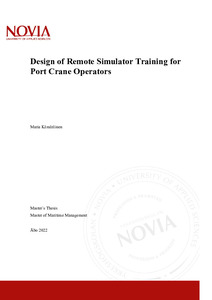Design of Remote Simulator Training for Port Crane Operators
Kämäräinen, Maria (2022)
Kämäräinen, Maria
2022
All rights reserved. This publication is copyrighted. You may download, display and print it for Your own personal use. Commercial use is prohibited.
Julkaisun pysyvä osoite on
https://urn.fi/URN:NBN:fi:amk-2022061417884
https://urn.fi/URN:NBN:fi:amk-2022061417884
Tiivistelmä
The Covid-19 pandemic caused large and unexpected problems in worldwide functions. In the educational world, new ways of working had to be invented so that teaching could continue. This applied to Ekami Consulting as well, because port crane operator trainings in Africa came to a halt. The aim of this thesis was to use service design methods to design a pedagogical script for remotely conducted port crane operator simulator training. Remote training is not just a solution to the pandemic or to other exceptional times, but also makes the services of Ekami more flexible. The flexibility entails less travelling which means savings for the service provider. Additionally, a positive impact on the climate is achieved.
Different service design methods were used in the research. Questionnaires, interviews and benchmarking were utilized. In addition, a vast amount of theoretical material was studied to find out what good online- and simulator learning means, and what the expectations and preferences of the students or customers were. Also, the cultural impact on people´s behavior and learning habits were taken into account when designing the pedagogical script.
It was found that remote implementation of simulator training does not differ dramatically from the traditional model. The same things that are monitored when a trainer and student are in the same location can be monitored remotely because the trainer has a visual and oral connection to the student. Contrastingly, the world of online learning was quickly found to be diverse, but also perplexing with the many different terms that are easy to confuse. Research results showed that design of good online training requires time and effort. Focus should be put on varying learning methods and methods to engage students. Furthermore, the cultural impact on the students´ learning habits should be taken into account when designing training for people around the world. Methods that work here in Finland may not work everywhere else in the world.
Based on the research results and other material that were studied, an early prototype of the pedagogical script for remote simulator training for port crane operators was designed as a final product of this thesis. The script includes phases of both simulator and online training. There was no time or possibility to do a piloting of the training model during this thesis process, thus only part of the service design process was achieved. The next step is to test the pedagogical script in practice together with customer and develop the service further.
Different service design methods were used in the research. Questionnaires, interviews and benchmarking were utilized. In addition, a vast amount of theoretical material was studied to find out what good online- and simulator learning means, and what the expectations and preferences of the students or customers were. Also, the cultural impact on people´s behavior and learning habits were taken into account when designing the pedagogical script.
It was found that remote implementation of simulator training does not differ dramatically from the traditional model. The same things that are monitored when a trainer and student are in the same location can be monitored remotely because the trainer has a visual and oral connection to the student. Contrastingly, the world of online learning was quickly found to be diverse, but also perplexing with the many different terms that are easy to confuse. Research results showed that design of good online training requires time and effort. Focus should be put on varying learning methods and methods to engage students. Furthermore, the cultural impact on the students´ learning habits should be taken into account when designing training for people around the world. Methods that work here in Finland may not work everywhere else in the world.
Based on the research results and other material that were studied, an early prototype of the pedagogical script for remote simulator training for port crane operators was designed as a final product of this thesis. The script includes phases of both simulator and online training. There was no time or possibility to do a piloting of the training model during this thesis process, thus only part of the service design process was achieved. The next step is to test the pedagogical script in practice together with customer and develop the service further.
